NHS Five Year Forward View for Mental Health: Policy and Evaluation
VerifiedAdded on 2023/06/18
|11
|3170
|100
AI Summary
This essay discusses the history and evolution of mental health policy in UK along with key elements of the NHS five year forward view for mental health and any gaps in the policy. Stakeholder mapping of the policy and the role of policy in addressing health equity and inequalities issues is also covered in this essay.
Contribute Materials
Your contribution can guide someone’s learning journey. Share your
documents today.
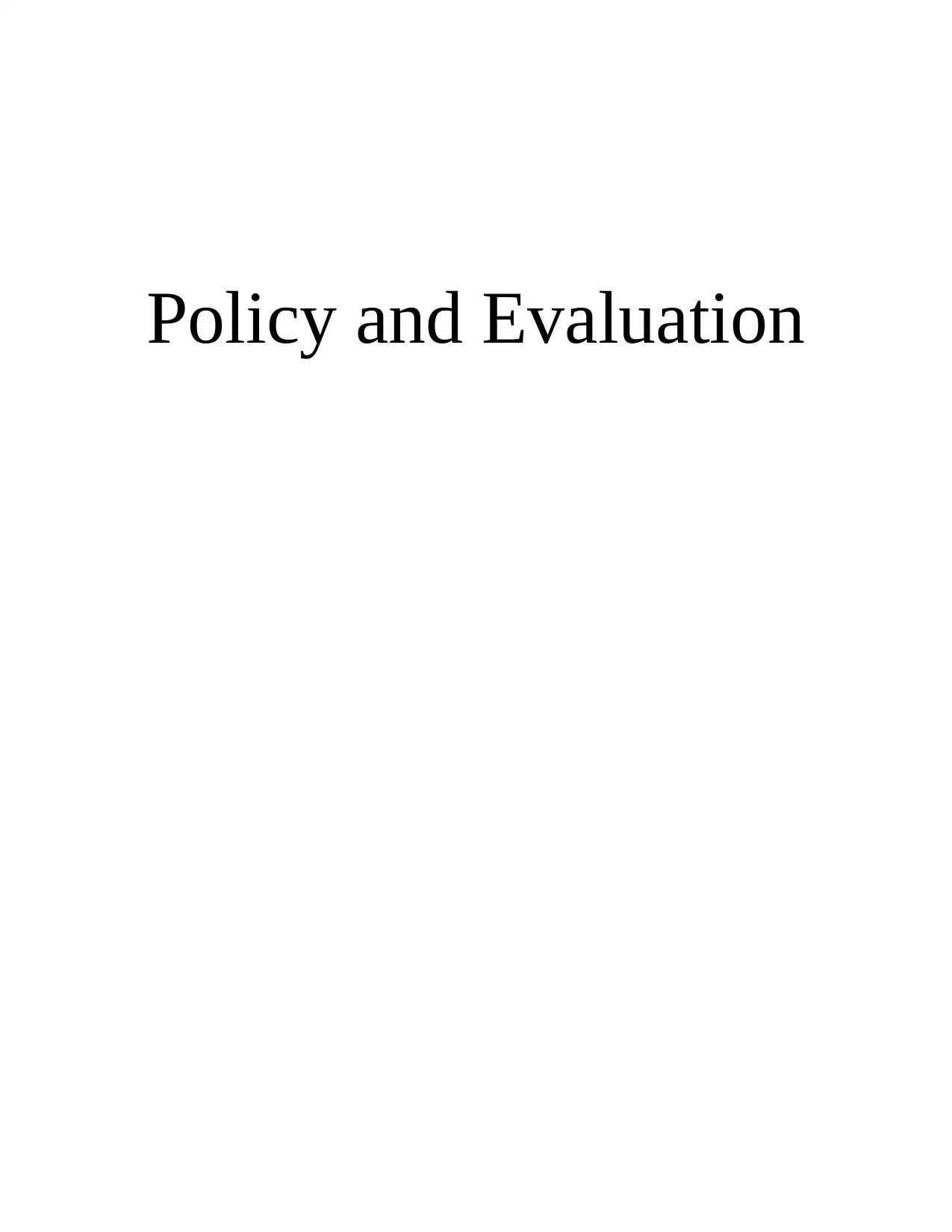
Policy and Evaluation
Secure Best Marks with AI Grader
Need help grading? Try our AI Grader for instant feedback on your assignments.

Table of Contents
INTRODUCTION...........................................................................................................................1
BACKGROUND ...........................................................................................................................1
MAIN BODY..................................................................................................................................2
CONCLUSION................................................................................................................................7
REFERENCES................................................................................................................................8
INTRODUCTION...........................................................................................................................1
BACKGROUND ...........................................................................................................................1
MAIN BODY..................................................................................................................................2
CONCLUSION................................................................................................................................7
REFERENCES................................................................................................................................8
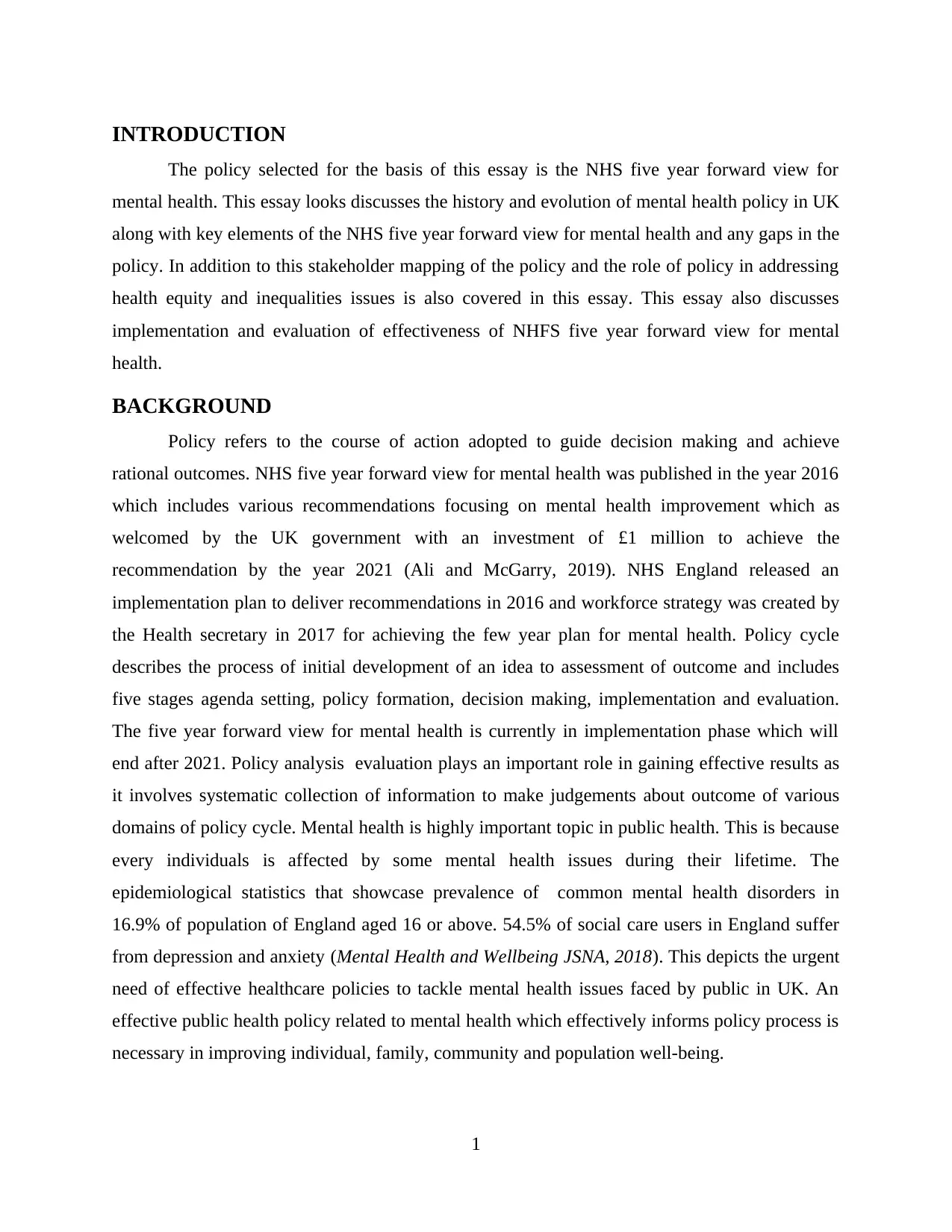
INTRODUCTION
The policy selected for the basis of this essay is the NHS five year forward view for
mental health. This essay looks discusses the history and evolution of mental health policy in UK
along with key elements of the NHS five year forward view for mental health and any gaps in the
policy. In addition to this stakeholder mapping of the policy and the role of policy in addressing
health equity and inequalities issues is also covered in this essay. This essay also discusses
implementation and evaluation of effectiveness of NHFS five year forward view for mental
health.
BACKGROUND
Policy refers to the course of action adopted to guide decision making and achieve
rational outcomes. NHS five year forward view for mental health was published in the year 2016
which includes various recommendations focusing on mental health improvement which as
welcomed by the UK government with an investment of £1 million to achieve the
recommendation by the year 2021 (Ali and McGarry, 2019). NHS England released an
implementation plan to deliver recommendations in 2016 and workforce strategy was created by
the Health secretary in 2017 for achieving the few year plan for mental health. Policy cycle
describes the process of initial development of an idea to assessment of outcome and includes
five stages agenda setting, policy formation, decision making, implementation and evaluation.
The five year forward view for mental health is currently in implementation phase which will
end after 2021. Policy analysis evaluation plays an important role in gaining effective results as
it involves systematic collection of information to make judgements about outcome of various
domains of policy cycle. Mental health is highly important topic in public health. This is because
every individuals is affected by some mental health issues during their lifetime. The
epidemiological statistics that showcase prevalence of common mental health disorders in
16.9% of population of England aged 16 or above. 54.5% of social care users in England suffer
from depression and anxiety (Mental Health and Wellbeing JSNA, 2018). This depicts the urgent
need of effective healthcare policies to tackle mental health issues faced by public in UK. An
effective public health policy related to mental health which effectively informs policy process is
necessary in improving individual, family, community and population well-being.
1
The policy selected for the basis of this essay is the NHS five year forward view for
mental health. This essay looks discusses the history and evolution of mental health policy in UK
along with key elements of the NHS five year forward view for mental health and any gaps in the
policy. In addition to this stakeholder mapping of the policy and the role of policy in addressing
health equity and inequalities issues is also covered in this essay. This essay also discusses
implementation and evaluation of effectiveness of NHFS five year forward view for mental
health.
BACKGROUND
Policy refers to the course of action adopted to guide decision making and achieve
rational outcomes. NHS five year forward view for mental health was published in the year 2016
which includes various recommendations focusing on mental health improvement which as
welcomed by the UK government with an investment of £1 million to achieve the
recommendation by the year 2021 (Ali and McGarry, 2019). NHS England released an
implementation plan to deliver recommendations in 2016 and workforce strategy was created by
the Health secretary in 2017 for achieving the few year plan for mental health. Policy cycle
describes the process of initial development of an idea to assessment of outcome and includes
five stages agenda setting, policy formation, decision making, implementation and evaluation.
The five year forward view for mental health is currently in implementation phase which will
end after 2021. Policy analysis evaluation plays an important role in gaining effective results as
it involves systematic collection of information to make judgements about outcome of various
domains of policy cycle. Mental health is highly important topic in public health. This is because
every individuals is affected by some mental health issues during their lifetime. The
epidemiological statistics that showcase prevalence of common mental health disorders in
16.9% of population of England aged 16 or above. 54.5% of social care users in England suffer
from depression and anxiety (Mental Health and Wellbeing JSNA, 2018). This depicts the urgent
need of effective healthcare policies to tackle mental health issues faced by public in UK. An
effective public health policy related to mental health which effectively informs policy process is
necessary in improving individual, family, community and population well-being.
1
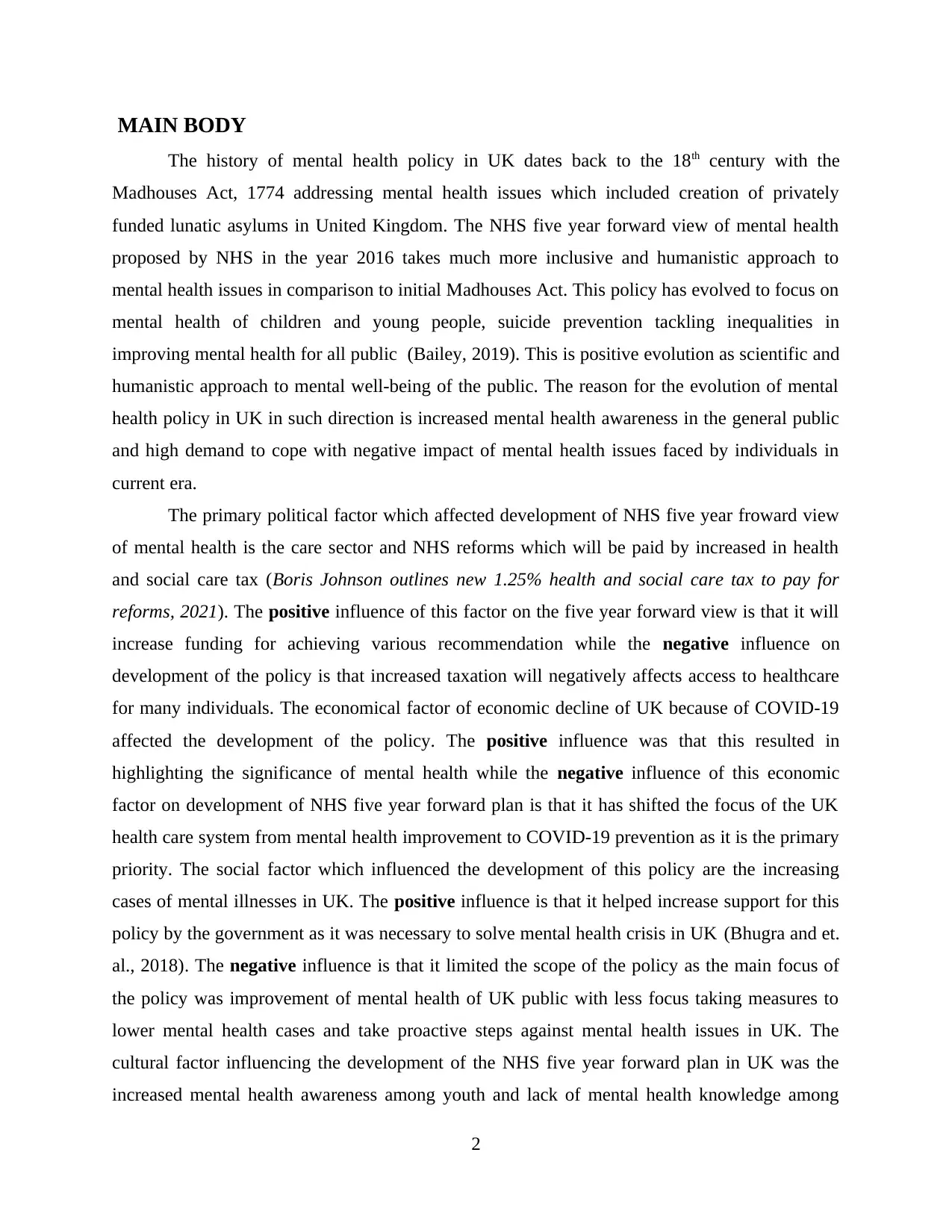
MAIN BODY
The history of mental health policy in UK dates back to the 18th century with the
Madhouses Act, 1774 addressing mental health issues which included creation of privately
funded lunatic asylums in United Kingdom. The NHS five year forward view of mental health
proposed by NHS in the year 2016 takes much more inclusive and humanistic approach to
mental health issues in comparison to initial Madhouses Act. This policy has evolved to focus on
mental health of children and young people, suicide prevention tackling inequalities in
improving mental health for all public (Bailey, 2019). This is positive evolution as scientific and
humanistic approach to mental well-being of the public. The reason for the evolution of mental
health policy in UK in such direction is increased mental health awareness in the general public
and high demand to cope with negative impact of mental health issues faced by individuals in
current era.
The primary political factor which affected development of NHS five year froward view
of mental health is the care sector and NHS reforms which will be paid by increased in health
and social care tax (Boris Johnson outlines new 1.25% health and social care tax to pay for
reforms, 2021). The positive influence of this factor on the five year forward view is that it will
increase funding for achieving various recommendation while the negative influence on
development of the policy is that increased taxation will negatively affects access to healthcare
for many individuals. The economical factor of economic decline of UK because of COVID-19
affected the development of the policy. The positive influence was that this resulted in
highlighting the significance of mental health while the negative influence of this economic
factor on development of NHS five year forward plan is that it has shifted the focus of the UK
health care system from mental health improvement to COVID-19 prevention as it is the primary
priority. The social factor which influenced the development of this policy are the increasing
cases of mental illnesses in UK. The positive influence is that it helped increase support for this
policy by the government as it was necessary to solve mental health crisis in UK (Bhugra and et.
al., 2018). The negative influence is that it limited the scope of the policy as the main focus of
the policy was improvement of mental health of UK public with less focus taking measures to
lower mental health cases and take proactive steps against mental health issues in UK. The
cultural factor influencing the development of the NHS five year forward plan in UK was the
increased mental health awareness among youth and lack of mental health knowledge among
2
The history of mental health policy in UK dates back to the 18th century with the
Madhouses Act, 1774 addressing mental health issues which included creation of privately
funded lunatic asylums in United Kingdom. The NHS five year forward view of mental health
proposed by NHS in the year 2016 takes much more inclusive and humanistic approach to
mental health issues in comparison to initial Madhouses Act. This policy has evolved to focus on
mental health of children and young people, suicide prevention tackling inequalities in
improving mental health for all public (Bailey, 2019). This is positive evolution as scientific and
humanistic approach to mental well-being of the public. The reason for the evolution of mental
health policy in UK in such direction is increased mental health awareness in the general public
and high demand to cope with negative impact of mental health issues faced by individuals in
current era.
The primary political factor which affected development of NHS five year froward view
of mental health is the care sector and NHS reforms which will be paid by increased in health
and social care tax (Boris Johnson outlines new 1.25% health and social care tax to pay for
reforms, 2021). The positive influence of this factor on the five year forward view is that it will
increase funding for achieving various recommendation while the negative influence on
development of the policy is that increased taxation will negatively affects access to healthcare
for many individuals. The economical factor of economic decline of UK because of COVID-19
affected the development of the policy. The positive influence was that this resulted in
highlighting the significance of mental health while the negative influence of this economic
factor on development of NHS five year forward plan is that it has shifted the focus of the UK
health care system from mental health improvement to COVID-19 prevention as it is the primary
priority. The social factor which influenced the development of this policy are the increasing
cases of mental illnesses in UK. The positive influence is that it helped increase support for this
policy by the government as it was necessary to solve mental health crisis in UK (Bhugra and et.
al., 2018). The negative influence is that it limited the scope of the policy as the main focus of
the policy was improvement of mental health of UK public with less focus taking measures to
lower mental health cases and take proactive steps against mental health issues in UK. The
cultural factor influencing the development of the NHS five year forward plan in UK was the
increased mental health awareness among youth and lack of mental health knowledge among
2
Paraphrase This Document
Need a fresh take? Get an instant paraphrase of this document with our AI Paraphraser
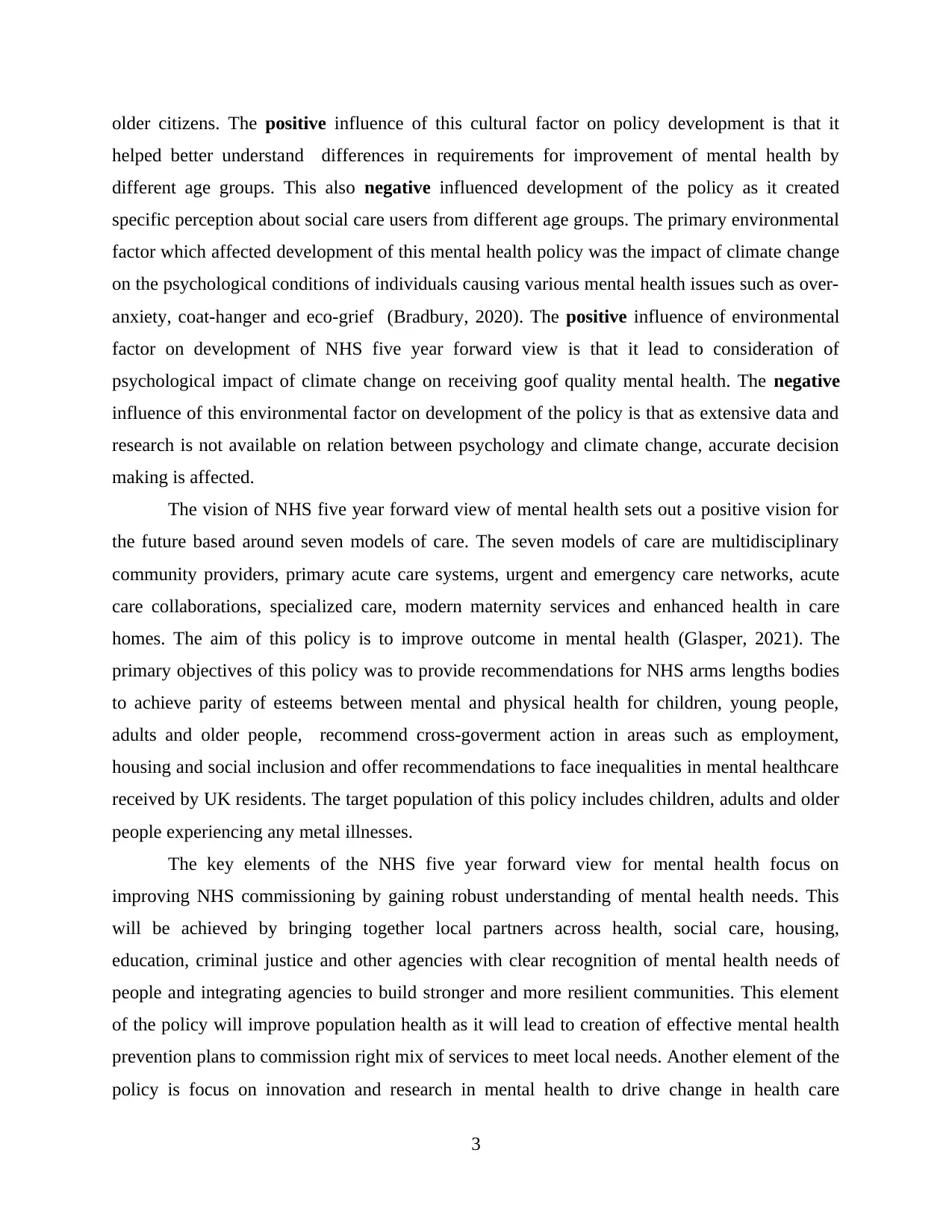
older citizens. The positive influence of this cultural factor on policy development is that it
helped better understand differences in requirements for improvement of mental health by
different age groups. This also negative influenced development of the policy as it created
specific perception about social care users from different age groups. The primary environmental
factor which affected development of this mental health policy was the impact of climate change
on the psychological conditions of individuals causing various mental health issues such as over-
anxiety, coat-hanger and eco-grief (Bradbury, 2020). The positive influence of environmental
factor on development of NHS five year forward view is that it lead to consideration of
psychological impact of climate change on receiving goof quality mental health. The negative
influence of this environmental factor on development of the policy is that as extensive data and
research is not available on relation between psychology and climate change, accurate decision
making is affected.
The vision of NHS five year forward view of mental health sets out a positive vision for
the future based around seven models of care. The seven models of care are multidisciplinary
community providers, primary acute care systems, urgent and emergency care networks, acute
care collaborations, specialized care, modern maternity services and enhanced health in care
homes. The aim of this policy is to improve outcome in mental health (Glasper, 2021). The
primary objectives of this policy was to provide recommendations for NHS arms lengths bodies
to achieve parity of esteems between mental and physical health for children, young people,
adults and older people, recommend cross-goverment action in areas such as employment,
housing and social inclusion and offer recommendations to face inequalities in mental healthcare
received by UK residents. The target population of this policy includes children, adults and older
people experiencing any metal illnesses.
The key elements of the NHS five year forward view for mental health focus on
improving NHS commissioning by gaining robust understanding of mental health needs. This
will be achieved by bringing together local partners across health, social care, housing,
education, criminal justice and other agencies with clear recognition of mental health needs of
people and integrating agencies to build stronger and more resilient communities. This element
of the policy will improve population health as it will lead to creation of effective mental health
prevention plans to commission right mix of services to meet local needs. Another element of the
policy is focus on innovation and research in mental health to drive change in health care
3
helped better understand differences in requirements for improvement of mental health by
different age groups. This also negative influenced development of the policy as it created
specific perception about social care users from different age groups. The primary environmental
factor which affected development of this mental health policy was the impact of climate change
on the psychological conditions of individuals causing various mental health issues such as over-
anxiety, coat-hanger and eco-grief (Bradbury, 2020). The positive influence of environmental
factor on development of NHS five year forward view is that it lead to consideration of
psychological impact of climate change on receiving goof quality mental health. The negative
influence of this environmental factor on development of the policy is that as extensive data and
research is not available on relation between psychology and climate change, accurate decision
making is affected.
The vision of NHS five year forward view of mental health sets out a positive vision for
the future based around seven models of care. The seven models of care are multidisciplinary
community providers, primary acute care systems, urgent and emergency care networks, acute
care collaborations, specialized care, modern maternity services and enhanced health in care
homes. The aim of this policy is to improve outcome in mental health (Glasper, 2021). The
primary objectives of this policy was to provide recommendations for NHS arms lengths bodies
to achieve parity of esteems between mental and physical health for children, young people,
adults and older people, recommend cross-goverment action in areas such as employment,
housing and social inclusion and offer recommendations to face inequalities in mental healthcare
received by UK residents. The target population of this policy includes children, adults and older
people experiencing any metal illnesses.
The key elements of the NHS five year forward view for mental health focus on
improving NHS commissioning by gaining robust understanding of mental health needs. This
will be achieved by bringing together local partners across health, social care, housing,
education, criminal justice and other agencies with clear recognition of mental health needs of
people and integrating agencies to build stronger and more resilient communities. This element
of the policy will improve population health as it will lead to creation of effective mental health
prevention plans to commission right mix of services to meet local needs. Another element of the
policy is focus on innovation and research in mental health to drive change in health care
3
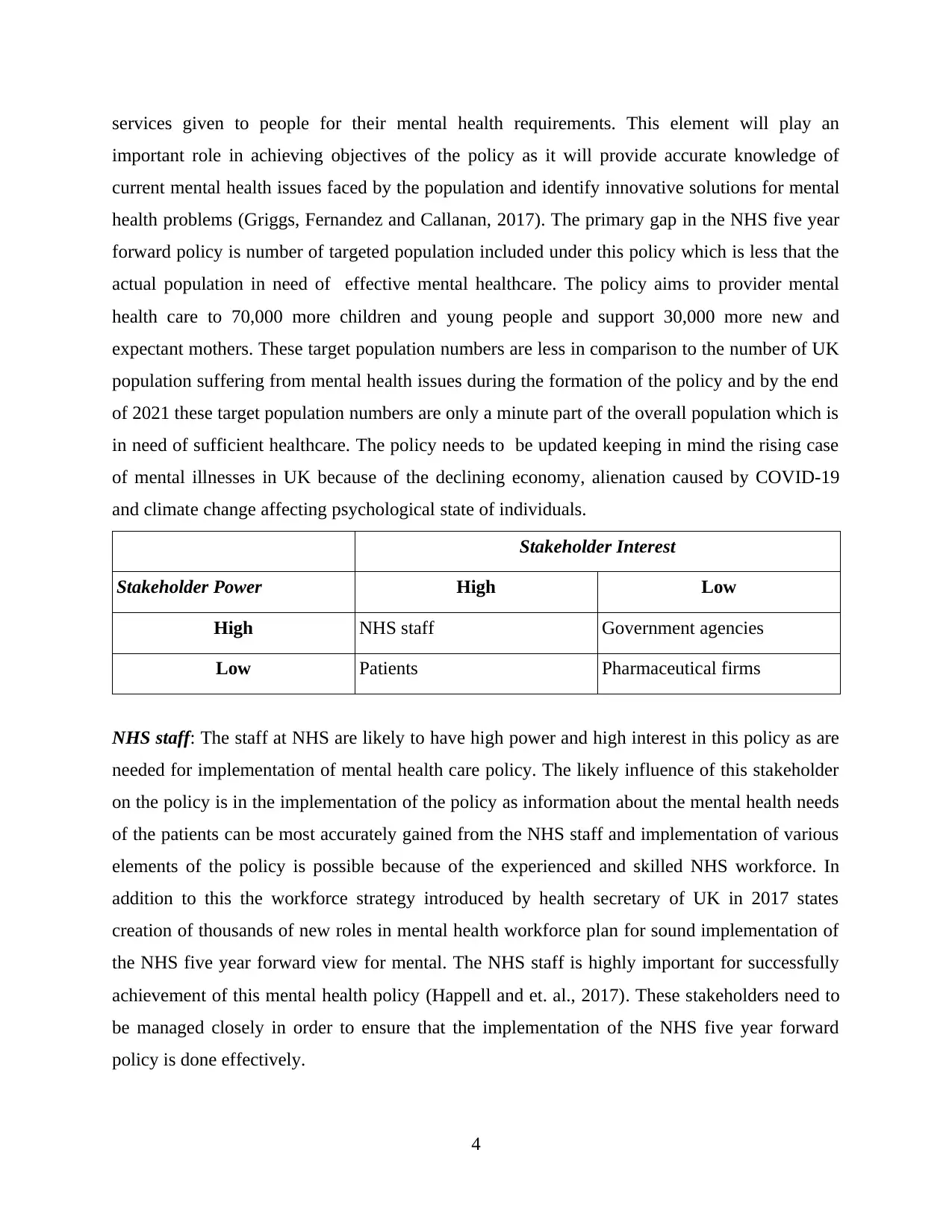
services given to people for their mental health requirements. This element will play an
important role in achieving objectives of the policy as it will provide accurate knowledge of
current mental health issues faced by the population and identify innovative solutions for mental
health problems (Griggs, Fernandez and Callanan, 2017). The primary gap in the NHS five year
forward policy is number of targeted population included under this policy which is less that the
actual population in need of effective mental healthcare. The policy aims to provider mental
health care to 70,000 more children and young people and support 30,000 more new and
expectant mothers. These target population numbers are less in comparison to the number of UK
population suffering from mental health issues during the formation of the policy and by the end
of 2021 these target population numbers are only a minute part of the overall population which is
in need of sufficient healthcare. The policy needs to be updated keeping in mind the rising case
of mental illnesses in UK because of the declining economy, alienation caused by COVID-19
and climate change affecting psychological state of individuals.
Stakeholder Interest
Stakeholder Power High Low
High NHS staff Government agencies
Low Patients Pharmaceutical firms
NHS staff: The staff at NHS are likely to have high power and high interest in this policy as are
needed for implementation of mental health care policy. The likely influence of this stakeholder
on the policy is in the implementation of the policy as information about the mental health needs
of the patients can be most accurately gained from the NHS staff and implementation of various
elements of the policy is possible because of the experienced and skilled NHS workforce. In
addition to this the workforce strategy introduced by health secretary of UK in 2017 states
creation of thousands of new roles in mental health workforce plan for sound implementation of
the NHS five year forward view for mental. The NHS staff is highly important for successfully
achievement of this mental health policy (Happell and et. al., 2017). These stakeholders need to
be managed closely in order to ensure that the implementation of the NHS five year forward
policy is done effectively.
4
important role in achieving objectives of the policy as it will provide accurate knowledge of
current mental health issues faced by the population and identify innovative solutions for mental
health problems (Griggs, Fernandez and Callanan, 2017). The primary gap in the NHS five year
forward policy is number of targeted population included under this policy which is less that the
actual population in need of effective mental healthcare. The policy aims to provider mental
health care to 70,000 more children and young people and support 30,000 more new and
expectant mothers. These target population numbers are less in comparison to the number of UK
population suffering from mental health issues during the formation of the policy and by the end
of 2021 these target population numbers are only a minute part of the overall population which is
in need of sufficient healthcare. The policy needs to be updated keeping in mind the rising case
of mental illnesses in UK because of the declining economy, alienation caused by COVID-19
and climate change affecting psychological state of individuals.
Stakeholder Interest
Stakeholder Power High Low
High NHS staff Government agencies
Low Patients Pharmaceutical firms
NHS staff: The staff at NHS are likely to have high power and high interest in this policy as are
needed for implementation of mental health care policy. The likely influence of this stakeholder
on the policy is in the implementation of the policy as information about the mental health needs
of the patients can be most accurately gained from the NHS staff and implementation of various
elements of the policy is possible because of the experienced and skilled NHS workforce. In
addition to this the workforce strategy introduced by health secretary of UK in 2017 states
creation of thousands of new roles in mental health workforce plan for sound implementation of
the NHS five year forward view for mental. The NHS staff is highly important for successfully
achievement of this mental health policy (Happell and et. al., 2017). These stakeholders need to
be managed closely in order to ensure that the implementation of the NHS five year forward
policy is done effectively.
4

Government agencies: The government agencies of UK which include public health agencies,
voluntary agencies, local authorities, education and youth justice services need to work in
collaborative manner in order to gain successful outcome of this policy. These government
agencies have low interest in this policy because mental health objectives are outside of their
professional domain but have high power because their collaboration is essential in gaining
successful objectives. The mental health of individuals is contingent on large number of factors
and is highly complicated in comparison to physical care and health. This increases the
importance of government agencies in facilitating collaborative action to improve mental health
of individuals in UK (Lamb, 2017). The likely influence of these authorities on the NHS five
year froward plan is related to effective implementation of the policy. This is because
collaboration between health care workers an, social care workers and different government
agencies is required to provide good quality care to individuals from different backgrounds and
also tackle the issues of inequality in mental health care retrieved by health care users. The level
of collaboration of local government agencies in UK will play a deciding role in success of this
policy in various parts of the country. The government agencies have high power and low
interest which means that these authorities need to kept satisfied in order to ensure continuous
collaboration.
Patients: The health care service users or the mental health patients are another primary
stakeholder of this policy but they are likely to have low power as a stakeholder. This is because
the health care services given to the patients by collaboration between different government
authorities is not formed or implemented by control of the patients. The patients health will be
considered during forming strategy form implementation of the policy but the patients do not
posses any power to change or influence the policy directly. These stakeholder have high interest
in the policy as the objective of the policy is targetted towards mental health patients in UK (le
Roux and et. al., 2021). The likely influence of these stakeholders on development and
implementation of the policy is that the inequalities faced by patients, the population of mental
health care users will pays significant role in funding and implementation of the policy. As these
stakeholders have low power but high interest, they need to be kept informed.
Pharmaceutical firms: These stakeholders are likely to have low interest and low power but
they are an important stakeholder as pharmaceutical firms provide medication and other tools for
diagnosis and treatment of various mental health illnesses. The price of various pharmaceutical
5
voluntary agencies, local authorities, education and youth justice services need to work in
collaborative manner in order to gain successful outcome of this policy. These government
agencies have low interest in this policy because mental health objectives are outside of their
professional domain but have high power because their collaboration is essential in gaining
successful objectives. The mental health of individuals is contingent on large number of factors
and is highly complicated in comparison to physical care and health. This increases the
importance of government agencies in facilitating collaborative action to improve mental health
of individuals in UK (Lamb, 2017). The likely influence of these authorities on the NHS five
year froward plan is related to effective implementation of the policy. This is because
collaboration between health care workers an, social care workers and different government
agencies is required to provide good quality care to individuals from different backgrounds and
also tackle the issues of inequality in mental health care retrieved by health care users. The level
of collaboration of local government agencies in UK will play a deciding role in success of this
policy in various parts of the country. The government agencies have high power and low
interest which means that these authorities need to kept satisfied in order to ensure continuous
collaboration.
Patients: The health care service users or the mental health patients are another primary
stakeholder of this policy but they are likely to have low power as a stakeholder. This is because
the health care services given to the patients by collaboration between different government
authorities is not formed or implemented by control of the patients. The patients health will be
considered during forming strategy form implementation of the policy but the patients do not
posses any power to change or influence the policy directly. These stakeholder have high interest
in the policy as the objective of the policy is targetted towards mental health patients in UK (le
Roux and et. al., 2021). The likely influence of these stakeholders on development and
implementation of the policy is that the inequalities faced by patients, the population of mental
health care users will pays significant role in funding and implementation of the policy. As these
stakeholders have low power but high interest, they need to be kept informed.
Pharmaceutical firms: These stakeholders are likely to have low interest and low power but
they are an important stakeholder as pharmaceutical firms provide medication and other tools for
diagnosis and treatment of various mental health illnesses. The price of various pharmaceutical
5
Secure Best Marks with AI Grader
Need help grading? Try our AI Grader for instant feedback on your assignments.
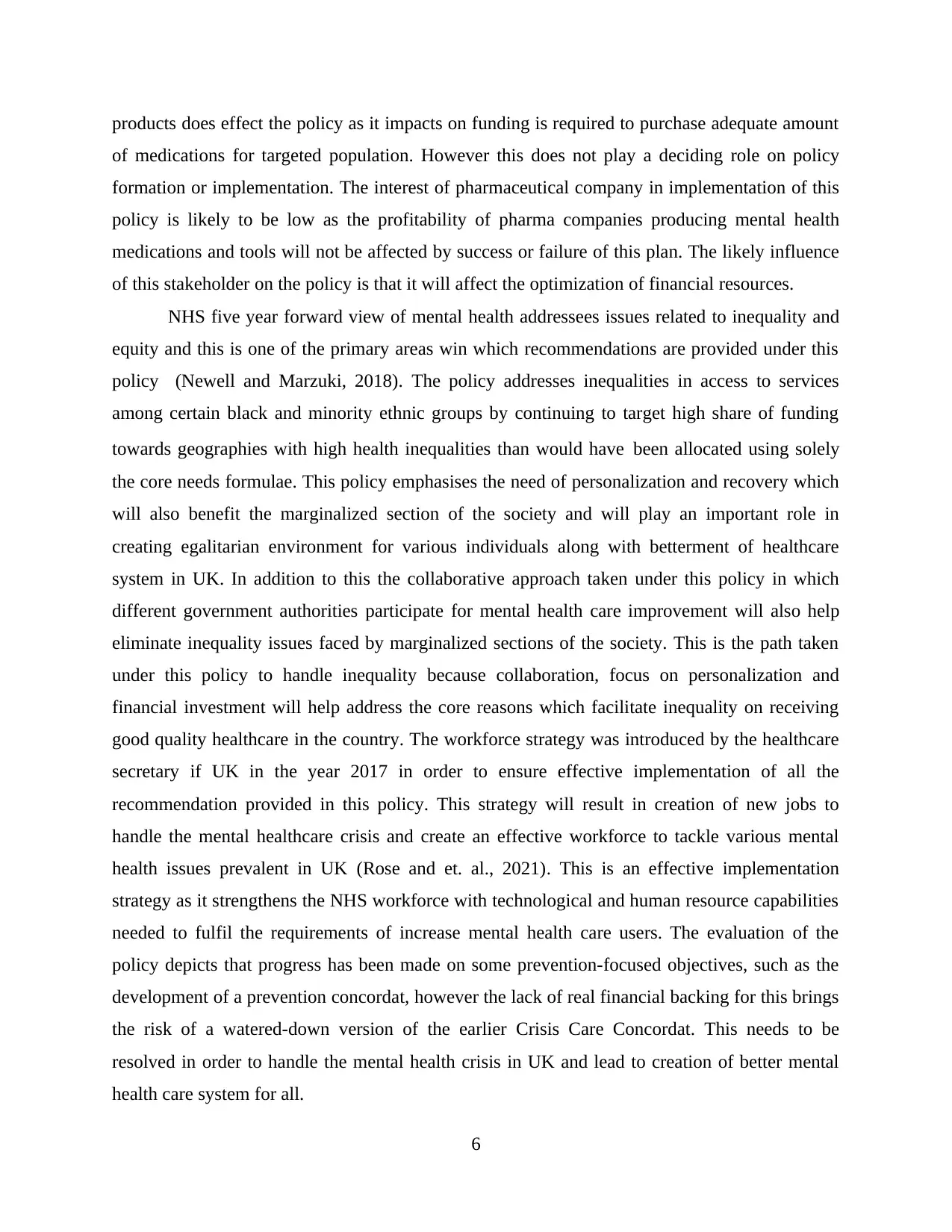
products does effect the policy as it impacts on funding is required to purchase adequate amount
of medications for targeted population. However this does not play a deciding role on policy
formation or implementation. The interest of pharmaceutical company in implementation of this
policy is likely to be low as the profitability of pharma companies producing mental health
medications and tools will not be affected by success or failure of this plan. The likely influence
of this stakeholder on the policy is that it will affect the optimization of financial resources.
NHS five year forward view of mental health addressees issues related to inequality and
equity and this is one of the primary areas win which recommendations are provided under this
policy (Newell and Marzuki, 2018). The policy addresses inequalities in access to services
among certain black and minority ethnic groups by continuing to target high share of funding
towards geographies with high health inequalities than would have been allocated using solely
the core needs formulae. This policy emphasises the need of personalization and recovery which
will also benefit the marginalized section of the society and will play an important role in
creating egalitarian environment for various individuals along with betterment of healthcare
system in UK. In addition to this the collaborative approach taken under this policy in which
different government authorities participate for mental health care improvement will also help
eliminate inequality issues faced by marginalized sections of the society. This is the path taken
under this policy to handle inequality because collaboration, focus on personalization and
financial investment will help address the core reasons which facilitate inequality on receiving
good quality healthcare in the country. The workforce strategy was introduced by the healthcare
secretary if UK in the year 2017 in order to ensure effective implementation of all the
recommendation provided in this policy. This strategy will result in creation of new jobs to
handle the mental healthcare crisis and create an effective workforce to tackle various mental
health issues prevalent in UK (Rose and et. al., 2021). This is an effective implementation
strategy as it strengthens the NHS workforce with technological and human resource capabilities
needed to fulfil the requirements of increase mental health care users. The evaluation of the
policy depicts that progress has been made on some prevention-focused objectives, such as the
development of a prevention concordat, however the lack of real financial backing for this brings
the risk of a watered-down version of the earlier Crisis Care Concordat. This needs to be
resolved in order to handle the mental health crisis in UK and lead to creation of better mental
health care system for all.
6
of medications for targeted population. However this does not play a deciding role on policy
formation or implementation. The interest of pharmaceutical company in implementation of this
policy is likely to be low as the profitability of pharma companies producing mental health
medications and tools will not be affected by success or failure of this plan. The likely influence
of this stakeholder on the policy is that it will affect the optimization of financial resources.
NHS five year forward view of mental health addressees issues related to inequality and
equity and this is one of the primary areas win which recommendations are provided under this
policy (Newell and Marzuki, 2018). The policy addresses inequalities in access to services
among certain black and minority ethnic groups by continuing to target high share of funding
towards geographies with high health inequalities than would have been allocated using solely
the core needs formulae. This policy emphasises the need of personalization and recovery which
will also benefit the marginalized section of the society and will play an important role in
creating egalitarian environment for various individuals along with betterment of healthcare
system in UK. In addition to this the collaborative approach taken under this policy in which
different government authorities participate for mental health care improvement will also help
eliminate inequality issues faced by marginalized sections of the society. This is the path taken
under this policy to handle inequality because collaboration, focus on personalization and
financial investment will help address the core reasons which facilitate inequality on receiving
good quality healthcare in the country. The workforce strategy was introduced by the healthcare
secretary if UK in the year 2017 in order to ensure effective implementation of all the
recommendation provided in this policy. This strategy will result in creation of new jobs to
handle the mental healthcare crisis and create an effective workforce to tackle various mental
health issues prevalent in UK (Rose and et. al., 2021). This is an effective implementation
strategy as it strengthens the NHS workforce with technological and human resource capabilities
needed to fulfil the requirements of increase mental health care users. The evaluation of the
policy depicts that progress has been made on some prevention-focused objectives, such as the
development of a prevention concordat, however the lack of real financial backing for this brings
the risk of a watered-down version of the earlier Crisis Care Concordat. This needs to be
resolved in order to handle the mental health crisis in UK and lead to creation of better mental
health care system for all.
6

7
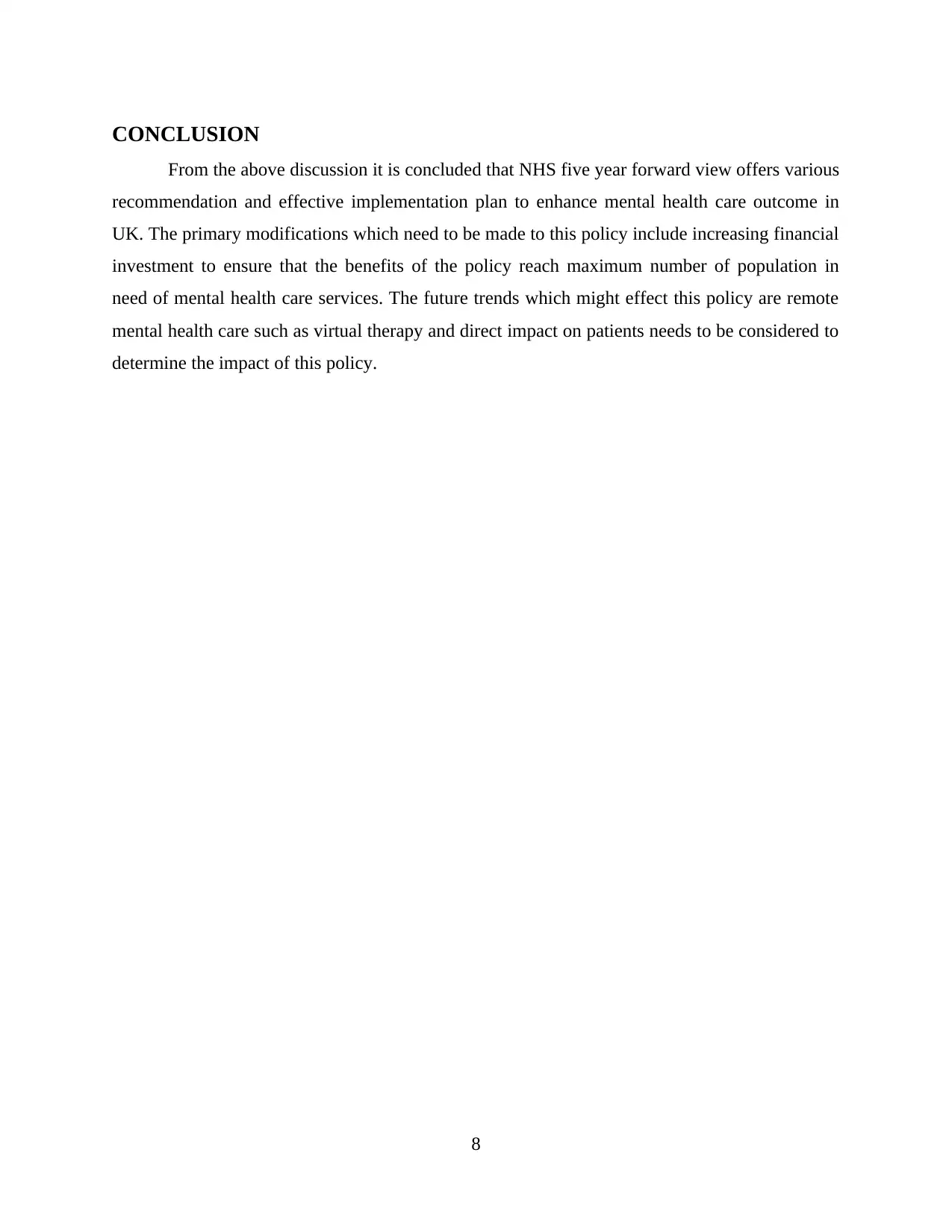
CONCLUSION
From the above discussion it is concluded that NHS five year forward view offers various
recommendation and effective implementation plan to enhance mental health care outcome in
UK. The primary modifications which need to be made to this policy include increasing financial
investment to ensure that the benefits of the policy reach maximum number of population in
need of mental health care services. The future trends which might effect this policy are remote
mental health care such as virtual therapy and direct impact on patients needs to be considered to
determine the impact of this policy.
8
From the above discussion it is concluded that NHS five year forward view offers various
recommendation and effective implementation plan to enhance mental health care outcome in
UK. The primary modifications which need to be made to this policy include increasing financial
investment to ensure that the benefits of the policy reach maximum number of population in
need of mental health care services. The future trends which might effect this policy are remote
mental health care such as virtual therapy and direct impact on patients needs to be considered to
determine the impact of this policy.
8
Paraphrase This Document
Need a fresh take? Get an instant paraphrase of this document with our AI Paraphraser
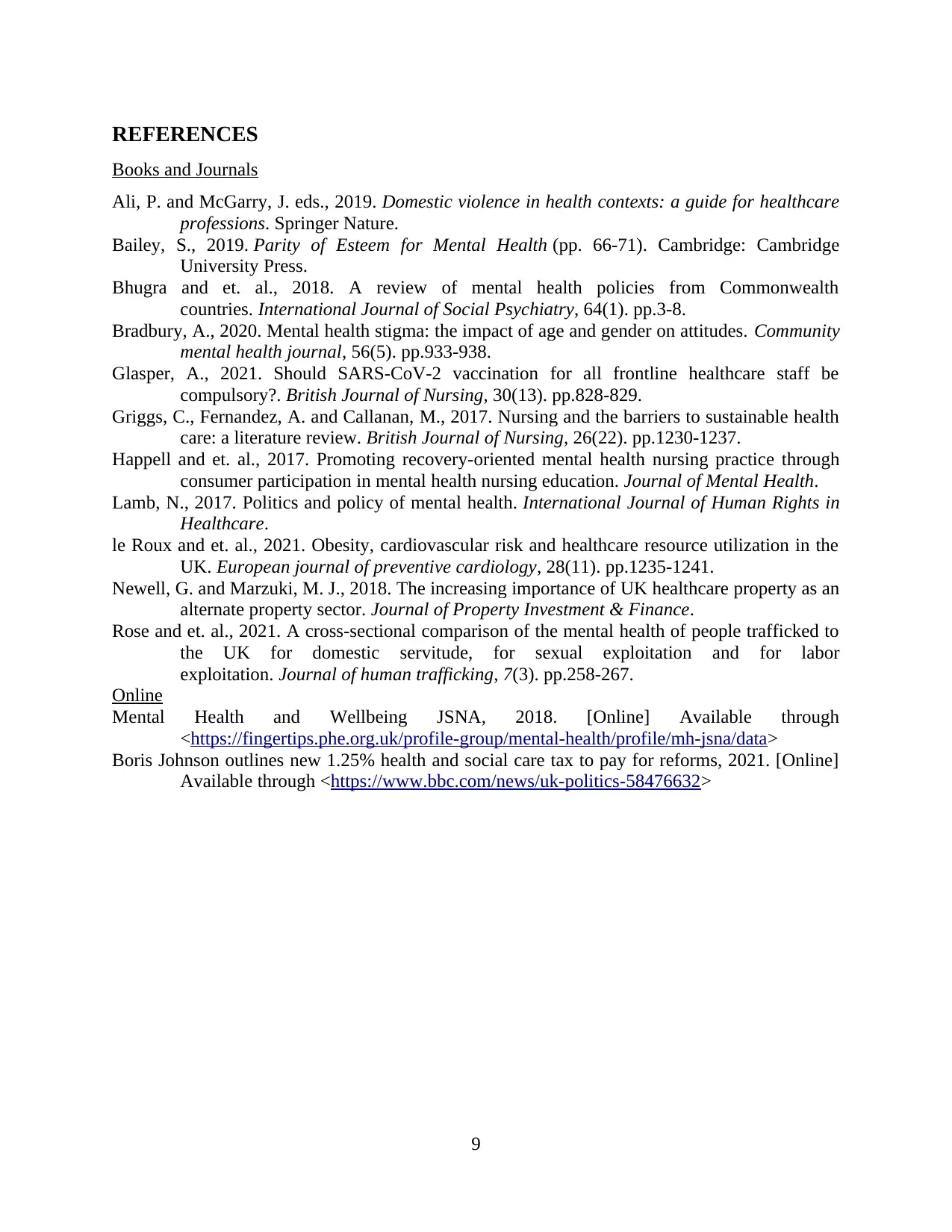
REFERENCES
Books and Journals
Ali, P. and McGarry, J. eds., 2019. Domestic violence in health contexts: a guide for healthcare
professions. Springer Nature.
Bailey, S., 2019. Parity of Esteem for Mental Health (pp. 66-71). Cambridge: Cambridge
University Press.
Bhugra and et. al., 2018. A review of mental health policies from Commonwealth
countries. International Journal of Social Psychiatry, 64(1). pp.3-8.
Bradbury, A., 2020. Mental health stigma: the impact of age and gender on attitudes. Community
mental health journal, 56(5). pp.933-938.
Glasper, A., 2021. Should SARS-CoV-2 vaccination for all frontline healthcare staff be
compulsory?. British Journal of Nursing, 30(13). pp.828-829.
Griggs, C., Fernandez, A. and Callanan, M., 2017. Nursing and the barriers to sustainable health
care: a literature review. British Journal of Nursing, 26(22). pp.1230-1237.
Happell and et. al., 2017. Promoting recovery-oriented mental health nursing practice through
consumer participation in mental health nursing education. Journal of Mental Health.
Lamb, N., 2017. Politics and policy of mental health. International Journal of Human Rights in
Healthcare.
le Roux and et. al., 2021. Obesity, cardiovascular risk and healthcare resource utilization in the
UK. European journal of preventive cardiology, 28(11). pp.1235-1241.
Newell, G. and Marzuki, M. J., 2018. The increasing importance of UK healthcare property as an
alternate property sector. Journal of Property Investment & Finance.
Rose and et. al., 2021. A cross-sectional comparison of the mental health of people trafficked to
the UK for domestic servitude, for sexual exploitation and for labor
exploitation. Journal of human trafficking, 7(3). pp.258-267.
Online
Mental Health and Wellbeing JSNA, 2018. [Online] Available through
<https://fingertips.phe.org.uk/profile-group/mental-health/profile/mh-jsna/data>
Boris Johnson outlines new 1.25% health and social care tax to pay for reforms, 2021. [Online]
Available through <https://www.bbc.com/news/uk-politics-58476632>
9
Books and Journals
Ali, P. and McGarry, J. eds., 2019. Domestic violence in health contexts: a guide for healthcare
professions. Springer Nature.
Bailey, S., 2019. Parity of Esteem for Mental Health (pp. 66-71). Cambridge: Cambridge
University Press.
Bhugra and et. al., 2018. A review of mental health policies from Commonwealth
countries. International Journal of Social Psychiatry, 64(1). pp.3-8.
Bradbury, A., 2020. Mental health stigma: the impact of age and gender on attitudes. Community
mental health journal, 56(5). pp.933-938.
Glasper, A., 2021. Should SARS-CoV-2 vaccination for all frontline healthcare staff be
compulsory?. British Journal of Nursing, 30(13). pp.828-829.
Griggs, C., Fernandez, A. and Callanan, M., 2017. Nursing and the barriers to sustainable health
care: a literature review. British Journal of Nursing, 26(22). pp.1230-1237.
Happell and et. al., 2017. Promoting recovery-oriented mental health nursing practice through
consumer participation in mental health nursing education. Journal of Mental Health.
Lamb, N., 2017. Politics and policy of mental health. International Journal of Human Rights in
Healthcare.
le Roux and et. al., 2021. Obesity, cardiovascular risk and healthcare resource utilization in the
UK. European journal of preventive cardiology, 28(11). pp.1235-1241.
Newell, G. and Marzuki, M. J., 2018. The increasing importance of UK healthcare property as an
alternate property sector. Journal of Property Investment & Finance.
Rose and et. al., 2021. A cross-sectional comparison of the mental health of people trafficked to
the UK for domestic servitude, for sexual exploitation and for labor
exploitation. Journal of human trafficking, 7(3). pp.258-267.
Online
Mental Health and Wellbeing JSNA, 2018. [Online] Available through
<https://fingertips.phe.org.uk/profile-group/mental-health/profile/mh-jsna/data>
Boris Johnson outlines new 1.25% health and social care tax to pay for reforms, 2021. [Online]
Available through <https://www.bbc.com/news/uk-politics-58476632>
9
1 out of 11
Related Documents
Your All-in-One AI-Powered Toolkit for Academic Success.
+13062052269
info@desklib.com
Available 24*7 on WhatsApp / Email
![[object Object]](/_next/static/media/star-bottom.7253800d.svg)
Unlock your academic potential
© 2024 | Zucol Services PVT LTD | All rights reserved.




